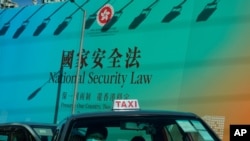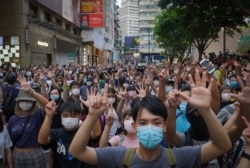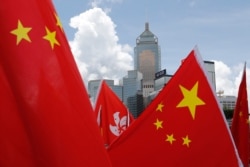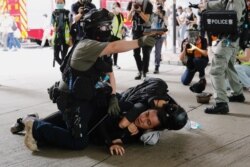Under the guise of national security, the Chinese Communist Party is using newly promulgated security laws in Hong Kong to secure and extend its one-party authoritarian rule to the former British colony, observers said.
The target of the party’s coming political persecution? The city’s pan-democrats and their like-minded activists, including media professionals, who have been critical of the Beijing government and seriously threatened the party’s authority there, a prominent rights lawyer in China told VOA by phone on Wednesday.
The lawyer spent time in prison after having been convicted of inciting state subversion.
Party interests
“Never is it about national interests; rather it’s the interests of the (Communist) regime that the party is protecting,” said the lawyer, who spoke on condition of anonymity because of the matter’s sensitivity.
“As long as you don’t see eye to eye with Beijing, your comments on any Hong Kong affair may next lead you to jail time,” he added.
Pan-democrats in Hong Kong last won a landslide victory in November’s district council elections, which will likely weaken the pro-Beijing camp’s prospects in September’s legislative elections and the 2022 race for the city’s leader.
Free to express?
Zhang Xiaoming, deputy director of the Hong Kong and Macau Affairs Office, denied that the new law is aimed at silencing the city’s pan-democrats.
Citing words from former Chinese leader Deng Xiaoping during a press briefing Wednesday morning, he painted a bigger picture of the city’s future political landscape.
“They (the opposition) can still express differing views, including those that are critical of the government. Deng Xiaoping said back then, after the handover of Hong Kong, (Hong Kongers) would still be allowed to criticize the Communist Party, but no action can be taken,” Zhang said.
“Hong Kong can never become a base for anti-China movement under the disguise of democracy. That is to say, there will be boundaries for the implementation of the One Country, Two Systems scheme,” he added.
Beijing will not tolerate those who fail to keep the scheme’s boundaries, Zhang maintained.
Wag the dog
While tightening controls in Hong Kong, the new security law further serves as a way for China’s top leader, Xi Jinping, to distract his people from the mounting political and economic pressures he faces both domestically and internationally, another observer said.
Wu Ruei-ren, an associate research fellow with Academia Sinica in Taipei, says he suspects that Xi’s administration rushed to enact the law a month after it was first introduced to divert scrutiny from his own political struggle.
Wu notes that Xi’s rule has been overshadowed by Beijing’s reemerged COVID-19 infections, post-pandemic economic headwinds, the discovery of new strains of swine flu in China that can affect people, as well as massive flooding in southern China. COVID-19 is the disease caused by the coronavirus.
“This is a very often-used strategy when you’re in big trouble. In crisis, you try to sway the attention from inside to outside. So, in English, there’s a phrase, which goes like wag the dog. I think he’s (Xi’s) wagging the dog,” Wu told VOA.
Both Wu and the lawyer said the 66 articles contained in the measure were not only hastily passed, but badly written, as the content and wording are “vague and arbitrary.”
A joke?
“The legislation will (go) down (in) China’s law-making history as a joke,” the lawyer said.
The measure stipulates that crimes of secession, subversion, terrorism and collusion with foreign forces are punishable by a maximum sentence of life in prison.
But what constitutes these offenses are not clearly specified, which Wu argued violates every basic legal principle and leaves room for courts to arbitrate.
Citing opinions by legal experts in Hong Kong, Wu said the new law will destroy the city’s much-cherished freedom and autonomy at least in 10 aspects.
For example, Beijing will establish a new security office in Hong Kong with its own law enforcement officers, who appear to be able to act beyond the city’s law or jurisdiction, according to a Hong Kong media report.
Also, the city’s chief executive will be empowered to appoint judges to hear national security cases, which raises fear about judicial independence, the report said.
In addition, the law’s Article 42 stipulates that no bail shall be granted unless the judge has sufficient grounds for believing that the accused will cease to commit acts endangering national security, which the city’s legal experts say violates the “presumption of bail” rule.
Never give up
Wu of Academic Sinica said that he expects the Beijing legislation, which had bypassed the city’s legislature and ignored widespread opposition, to end up backfiring, as pro-democracy activists in Hong Kong will not easily give up their fight.
“The mentality of Hong Kong protesters, especially younger protesters, I think they have been pushed to the corner, where they don’t care anymore. So, (among them) this is the real scorched-earth philosophy, you see, ‘If we burn, you burn with me,’” Wu said.
The rights lawyer said that he believed that the level of international pressure against China’s tightened grip on Hong Kong, following the law’s enforcement, will keep rising to a point where Beijing won’t be able to afford setting itself as a rival against the entire world.
Among U.S. politicians, Wu said he would like to see U.S. President Donald Trump and presumptive rival and former Vice President Joe Biden also introduce more policies that will toughen up against China in the lead-up to the presidential election in November.







